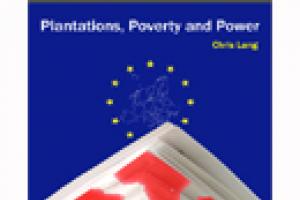As exposed in previous WRM Bulletin issues, criminalization is part of a strategy aimed at silencing any protest generally against the extractive activities of transnational corporations (see WRM Bulletin Nº 125). It is happening all over Southern countries. And it is happening right now in Indonesia, where it has victimized another fighter of social resistance to land-grabbing by palm oil-companies in the country.
Indonesia
Other information
27 February 2009
Other information
30 January 2009
Once more, the conflict over natural resources has played havoc on humble people. This time the criminal action took place on the settlement of Suluk Bongkal, Beringin, in the district of Bengkali, Riau Province, Sumatra.
Other information
30 January 2009
Before the current global economic meltdown, the pulp industry had ambitious expansion plans. Although the industry was closing mills in the North, it was expanding dramatically in the South where about five million tons of new capacity was due to start up each year for the next five years. Vast areas of monoculture tree plantations have been established to feed raw material to huge new megamills, particularly in Latin America, southeast Asia and South Africa.
Publications
18 December 2008
By Chris Lang
Bulletin articles
26 October 2008
It has been 63 years after Soekarno-Hatta proclaimed the independence of the Indonesia Republic on August 17, 1945. Every August especially on the 17th, Indonesians all along the archipelago celebrate this nation's anniversary.
Bulletin articles
27 September 2008
Indonesia is the world's second largest palm oil producer; together with Malaysia they account for about 80 percent of global palm-oil production. With actually around 6 million hectares of land planted with oil palm, Indonesia plans a significant expansion which is set to cover up to 20 million hectares by 2020.
Bulletin articles
26 June 2008
The state-owned company Perhutani boasts of having “one of the highest percentages of forest plantation in the world” (http://perhutaniproducts.com/) with a land area of 2,426,206 Ha in Java and Madura Island of Indonesia.
It has also the gloomy record of having severely damaged or destroyed well over half the 'state forest' of Wonosobo in Central Java (see WRM Bulletin Nº 96).
Other information
28 April 2008
A recent study published by WWF (1) analyzes deforestation and forest degradation in Riau Province between 1982 and 2007 and identifies their main drivers: pulpwood and oil palm industrial plantations.
The study shows that the fastest rate of deforestation in Indonesia is occurring in central Sumatra's Riau province, which used to have 78% of its land covered by forest. In the past 25 years, some 4.2m hectares (65%) of its tropical forests and peat swamps have been cleared for industrial plantations.
Other information
2 February 2008
Indonesia: Call for Action against certification of Riau Andalan Pulp and Paper’s timber plantations
The giant pulp company PT. Riau Andalan Pulp and Paper (PT. RAPP), operating in Riau Province, is applying for a Plantation Forest Management Certificate from the Indonesia Ecolabeling Institute (LEI) Certification System.
Riau-based NGOs and several regional and national NGOs are strongly challenging the application on several grounds including:
Other information
2 February 2008
The major issue of land tenure underlies the problem of oil palm schemes in Indonesia and elsewhere. Occupying large tracts of community land where food and cash crops used to be grown and medicines and building materials were harvested, monoculture oil palm plantations erode the rights and livelihoods of local communities.
Through promises, bribes, and cheating combined with the unawareness of local communities of their rights, companies move in leading to the large-scale privatisation of land and natural resources.
Other information
3 January 2008
Indonesia, a leading producer of palm oil, reached an output of 16 million tonnes in 2006, having tripled the area of land under oil palm plantation between 1995 and 2005.
Bulletin articles
5 December 2007
During the Conference of the Parties to the United Nations Framework Convention on Climate Change held in Bali, Indonesia, in December 2007, a number of social movements and groups agreed to establish a coalition called Climate Justice Now! in order to enhance exchange of information and cooperation among themselves and with other groups with the aim of intensifying actions to prevent and respond to climate change.

